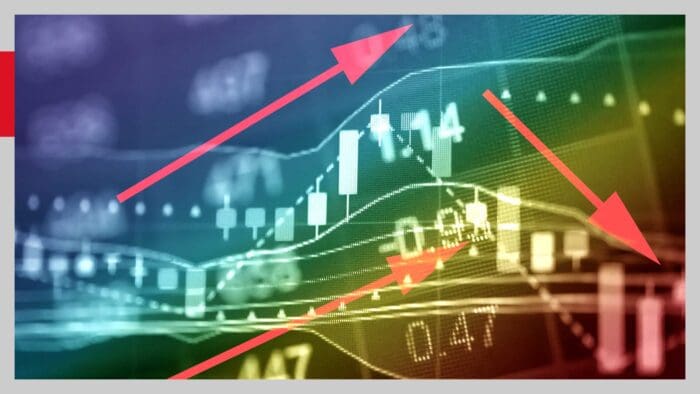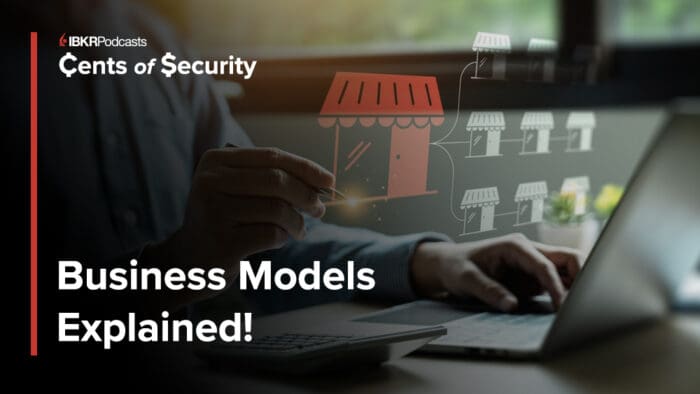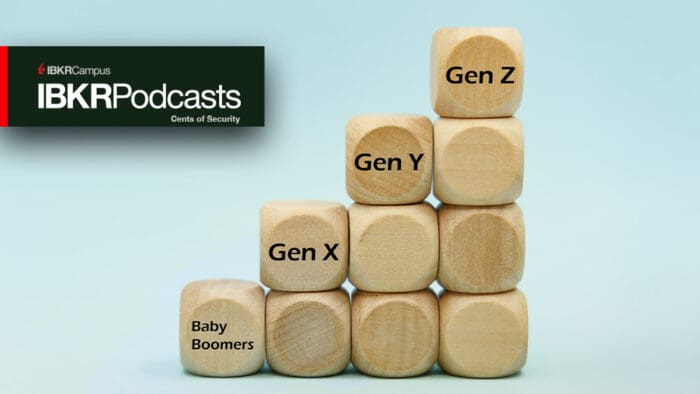Each generation has a different view on finance, which make sense since the economic experiences can differ. In this episode, we will explore the monetary habits of the Boomer, Gen X, and Millennial generations. We will discuss how these groups disrupted the financial landscape and set the economic stage for generations to come. Danielle Labotka, Ph.D., Behavioral scientist for Morningstar joins Cassidy Clement, IBKR’s Senior Manager of SEO and Content to discuss.
Corresponding Studies from Morningstar:
Dispatches From Generation Z | Morningstar
The Key to Personal Financial Planning: Being Lazy | Morningstar
Worried About a Recession Coming? You’re Not Alone. | Morningstar
Don’t Lose Money Chasing the Crowd | Morningstar
Summary – Cents of Security Podcasts Ep. 49
The following is a summary of a live audio recording and may contain errors in spelling or grammar. Although IBKR has edited for clarity no material changes have been made.
Cassidy Clement
Welcome back to the Cents of Security Podcast. I’m Cassidy Clement, Senior Manager of SEO and Content at Interactive Brokers. Today, I’m your host for our podcast and our guest is Danielle Labotka, Ph.D., Behavioral Scientist for Morningstar.
So she was previously on a podcast that was about the world of alternative investments. That’s where we talked about her research and then broke down some alternative assets that investors can be looking at when they’re in the world of alternative investments.
So for today’s topic, we’re going to look at financials and financial situations throughout generations. Each generation has had a different view on finance, which makes sense because economic conditions will differ per generation. And we’re also going to explore some of the monetary habits specifically for the Boomer, Gen X and Millennial generations.
So we’re going to look at how these groups disrupted the financial landscape and how they set the economic stage for the generations coming after them. So welcome back to the program, Danielle.
Danielle Labotka
Thank you for having me.
Cassidy Clement
So to just kick off, we’re going to talk about these financial qualities that differ throughout the generations and kind of as we talked about before recording, this is such a common topic for people who are, we’ll say, coming of age in today’s economic landscape, whether you’re Gen Z or a Millennial.
There are so many questions and we’ll say uncertainty with the economic cards, let’s say, that those generations have been dealt because the landscape is shifting so quickly. And for most dinner parties, get togethers, vacations, holidays, these topics are so common.
Hitting different milestones, you’re 16,18,21,25, etcetera and you get the “are you going to get a job?” “Are you going to get a car?” “Are you going to get a house?” “Are you going to college?” “What about your pet for your family?” “What about your first kid?”
All of these questions!
And they all get tied back to the economic landscape and the potential outcome or the outlook that most people have, at least when they think about answering these questions.
So let’s just start off with talking about what some of your research is on this topic and what it’s shown.
Danielle Labotka
Yeah, I mean, you hit it right on the head when you said that this is just a wildly popular topic. I mean, what generational differences there are is probably the most popular question we get whenever we conduct a new study. And so, as a result, you can probably imagine that we do typically look at how that affects the findings we get in the study.
However, we are looking at a wide range of topics here, right? So as you mentioned last time we talked, we talked about the research we did on alternative assets, but we’ve also looked at things like how do investors think about AI in finance? How do they respond to the threat of a recession? How do they think about their financial goals or what are they looking for in financial advisors?
Topics all over the place in the realm of finance. So understandably, there’s a lot of different answers to this question of how do generations differ here? But I would generally categorize them into studies where we find a difference between generation and studies where we don’t. And the reason why I make this distinction in my mind instead of something like oh you know, here are the studies where boomers are better off than Millennials. And here are the ones where Millennials are better off is because most of the time we actually don’t find too many differences between generations, which may be surprising to some people.
After all, I can probably pull up any given new site right now and find at least one piece that talks about generational differences, if not more than that. But since our team and the Behavioral Insights group is often looking at like what’s at the root of people’s behaviors, like their motivations, we tend to be tapping into things that are a bit more universal in terms of how we think about finances.
But there are times where we do find differences in generations, and I would say that when we’re doing this, this is probably true for other people as well, it tends to be when we’re looking at things that are situational, like savings for retirement, where the context really matters.
How are you expecting to fund your retirement? How much do you have saved? Have you ever taken out money from your 401K and taken a penalty? These are all really important questions to understand how generations are dealing with their economic conditions. But the answers really do differ, not because one generation is smarter than the other, or lazier than the other, but because generations are dealing with different economic environments in any given stage of life, and the things leading up to it were different for them.
So I think it’s good to recognize the differences, but also the similarities, and I’m sure we’re going to dive into a great deal of both today.
Cassidy Clement
Absolutely. Nail on the head when it comes to similarities and differences. I mean in general, people who are coming of age in an economic landscape and have to figure this out, that’s the basics. That’s for everybody. But then we have to look at the many different facets that impact that.
So to just set a little bit of a foundation here, we’re going to be looking at Boomers, Gen X and Millennials here. To break this down, I’ll go through some of the time frames. And some of the generalized characteristics for each of these generations. But really, what we’re trying to do today is kind of look at the spending versus saving economic environment, some behavioral finance trends.
And then how these generations are set up by their previous generation and how they set it up for the upcoming generation in terms of financial landscape. And at the tail end, how’s it looking for their retirement? How’s it looking for financial technology as it innovates? And then of course, with all of those, is how certain is the market or is there high amounts of market uncertainty?
So to just set the stage here a little bit, most people are familiar with the phrasing of these generations. But the Baby Boomers are kind of in the range of 1946-1964. You’re looking at a group that was generally a little bit more materialistic than the previous generation of their parents because usually the previous generation was more of a Great Depression era. And there was a lot of frugality in that time. Then to move on to the Generation X, which is usually ‘65, ‘68 to ‘80, that one is a little bit different than the previous because that’s when you start to get into credit cards taking the stage as they got into their teens or their 20s and cash and checkbooks being a lot easier or tangible money was a lot easier to see.
But there was also bank accounts were a lot more common because as we talked about previously with the Depression era, you may have heard the phrase hide the cash in the mattress that was during the Depression era, where people weren’t that trusting of banks and Gen X also was passing some of the previous generation with larger expenses for housing and education, which seems pale in comparison to our current generation of Millennial and Gen Z’s education and housing costs. But the Millennials tend to be about ‘81 to ‘96 or some people will stretch that to ‘98 or ‘99. That’s where I fall into play, where there was a lot of financial challenges because this is one of the more inflationary times in the economy.
There’s also a significant amount of debt in different forms for the American economy, whether it’s credit cards, homes, cars, education. And the dollar doesn’t consistently go as far as it did previously, that’s just because of the inflation rate literally being as high or going to be raised as much as it does as quickly as it does.
So that’s kind of just the quick version of taking 60-70 years and just shoving all of that Sociology and financial information into a quick whatever that is. A type 5.
What have you found that are the big pieces for these generations that make them them? And how they moved forward and set the stage of the financial economy, layout environment for the upcoming generations?
Danielle Labotka
Right. Yeah. So I’m going to start out with a little bit of a caveat, right? And I think you’ve already set this caveat nicely for me where you’re like, yeah, this is like 65 years, just like thrown into a little package for you all. It’s important to note that we’re like going to be talking in broad strokes here, right?
So you mentioned some years for the generations. But as you also kind of noted, they’re loosey goosey, right? At some point, somebody sat down and tried to define what these different generations were, and I’ve seen that at some points, Millennials even went up to those who were born in 2000 or 2004, right? Which are people who would be solidly considered Gen Z today.
When you hear your generation come up, you might be like, wow, that’s really different than what I experienced, and that’s totally normal. If it is, no group is really a monolith and you might even find that maybe you relate better to what we talk about for a different generation.
To illustrate this a little bit, I know that like my cousins and I span from Gen X to Gen Z, but as a younger Millennial, my Gen Z cousins and I have a lot more shared experiences than I do with my older Millennial cousins, who tend to relate more to their Gen X counterparts.
So keep that all in mind when we’re talking about these things. This is not diagnostic. If you don’t fall into this, that’s OK. There’s nothing wrong with you. But yeah, so let’s go back to those Baby Boomers and let’s talk about them a little bit more.
So there are 71,000,000 Baby Boomers alive today. They’re a really big generation. They’re second only currently to Millennials, who are the largest generation alive today. You know, I’ve actually heard them refer to as the luckiest generation in history, which is quite a title to hold. The time that they were born and grew up in was really this time of post war economic prosperity in the United States.
And because they were such a large generation, especially compared to those coming before them, right? It was a baby boom. There was a ton of babies all of a sudden. The economy really had to restructure itself around baby boomers and it continues to do that to this day. I mean, we can just take a step back and think about how much strife we experience and thinking about how are we going to deal with all of baby boomers eventually leaving the workforce, right? There are things that we have to consider. Like what kind of toll does that take on Social Security? How do we keep it solvent when every baby boomer is drawing on Social Security? How do our industries change? Like our medical services industry is going to have to grow and adapt, and we’re going to need more people trained in the medical services industry to deal with such a large aging population?
And even that aging is just changing the way that baby boomers spend their money, right? We’re seeing that now they’re spending more money in healthcare because they’re getting older and you just have to spend more money on your health when you get older.
Now, that’s not to say that the baby boomers haven’t experienced some economic blows. They were in the workforce and investing during both the Dot Com bust in the late 90s and early 2000s and during the Great Recession.
They also did find themselves in the midst of this shift in how we do retirement in America. So it used to be very common for employees to receive a defined benefit program from their employers, that’s called a pension. But now we’ve moved towards doing defined contribution programs like 401Ks.
To illustrate this a little bit more, in a pension system you go to work somewhere and they say great, you worked for us X amount of years and we’ll pay you this amount of money every year after you retire based on your salary.
You can still get a pension if, for instance, you’re working in the military and you retire from the military, but they’re really quite few and far between now. Instead, what we have are things like 401Ks, where the money that you get in retirement is really dependent upon how much money you save in your 401K or your IRA or whatever retirement account you have and how much it grows up until your retirement.
So baby boomers were kind of caught in the middle of this shift, which means that they actually started saving for retirement later than the other generations we’re talking about today. And that can be a bit of a problem for them because it means that they have had less time for their investments to grow. And so one of the things that we have seen with baby boomers, that’s kind of a trend is that they’re staying in the workforce a lot longer than previous generations.
And that’s partly because some people do need the funds to fund their retirement and fund their lifestyle. But it’s also a matter of preference for some. It’s interesting because we’re living longer now, but we’re also living those later years better. And so whereas for their parents, at the age of 65, they might not have been in really great health and therefore leading the workforce made a lot of sense, baby boomers are in better health than that, and so they might not feel the need to retire because they feel just fine and they like doing their work and it doesn’t take too much out of them at this point. But the pandemic did push some into retirement earlier than they wanted, but we have kind of seen a reversal of that trend as well, where some are returning to the workforce.
Again, they either need the money or they just really like working. So I would say all in all, baby boomers loom pretty large in American society right now. For example, they hold about half of all the wealth in this country. And that means that everyone that’s coming after them really is standing in their shadow.
So that does bring us to Gen X, and they’re about 20% of the US population, and they hold about 1/4 of the wealth. So they’re pretty even with how much they represent in terms of population and wealth. But in terms of like characterizing this generation, they do tend to be considered the middle child, which I say with all of the love in my heart is an actual middle child myself.
For those not familiar with the stereotype, middle children and Gen X tend to be seen as the overlooked group, right, especially compared to boomers than Millennials, which are larger generations than them.
They did have fairly good childhoods. Our country was fairly prosperous at the time, but those economic blows that we mentioned earlier like the Dot Com bust and the Great Recession hit them much harder than baby boomers because of where they were in their lives during those times.
So, for example, Gen X was the generation that was buying homes for the first time during the housing bubble leading up to the Great Recession. Which means that they paid the highest prices and they experienced the most underwater loans during the recession, which means that after the housing market collapsed, their mortgage balance was worth more than their home.
So even if you sold it, you would still owe money to the bank. They also are that first generation who must rely solely on defined contribution plans like 401Ks after that shift away from pensions. And these plans really rely on the market to grow, to help you fund your retirement.
But since Gen X experienced such bad markets early into their savings for retirement, the growth of their accounts has been slower than others. And many expect them actually to be the first generation to be worse off than their parents when it comes to retirement, which is like not a title we would like to hold, but we’ll go into the title that Millennials hold eventually, and it’s also not great.
But for right now, they continue, Gen X that is, continue to not be in a great position economically. Their wealth is lower than baby boomers, but they’ve had to spend more money on things like housing and education. It’s a theme that’s going to come up time and time again here. And right now, many of them are sandwiched between supporting and providing, not just for their children, but also for their aging parents. So they’re getting kind of squeezed on the spending front and on their just resources in general. You only have so many hours in a day.
So if you put all these factors together, it’s probably not too surprising to learn that Gen X actually currently holds the most amount of debt in the country, so again another title that you probably don’t want. It is the economic reality for a lot of people who are in the generation.
So you know, even though we tend to think about Millennials and Gen Z when we talk about issues like saving for retirement or affording homes and education, the ground work for a lot of these issues were really set in place when Gen X was starting to come into the workforce and deal with these things, so we kind of forget that, which again goes along with the whole theme of being the middle child.
And that does bring us to Millennials who are probably the most upsetting. I don’t know. Baby boomers were pretty upsetting to previous generations as well, but I feel like Millennials get a lot of “Millennials are destroying this industry and that industry and tend to be very upsetting to previous generations.”
But today they are in fact the largest adult generation with about 72 million and they do tend to be the children of baby boomers. But while their parents are considered to be part of the luckiest generation, Millennials have the title of being the unluckiest generation.
Yeah, that’s what I was referring to earlier. Millennials were entering the workforce during the Great Recession, and as a result, experienced the greatest amount of unemployment during that time. They were also hit hard again with issues of unemployment during the pandemic and these workplace difficulties were also paired with stagnant wages.
So the wages that are going up are not going up at the rate of cost of living. So it’s really putting a strain on Millennials who have already started in their careers in a not ideal landscape. And because of this, many Millennials have been part of what is now known as the gig economy, which is where you pick up jobs, kind of wherever you can to fill in those financial gaps.
Those include things like driving for a ride share or being part of a food delivery service and there have been more economic difficulties outside of the job market for Millennials, such as the rising cost of education and homes. So, for example, Millennials hold the most amount of student debt, which we’ve seen time and time again is a very difficult hole to dig yourself out of.
I mean, you can pretty much ask anybody who has student debt, and they will tell you that they have spent a lot of money just paying interest on it, not even getting out of the debt part. They are also first-time home buyers at a later age than previous generations. Again, I don’t think that this is a secret, but to kind of illustrate this a little bit more, last year the average first time home buyer was 35. So right now, Millennials are kind of the market of first-time home buyers.
But by contrast, 45% of boomers had actually bought their first home between the ages of 25 and 34. So it really is a later age that Millennials are buying their homes at. And on top of that, they actually need to be earning more money than their parents were to afford a home. And that’s even when you account for things like inflation.
So homes are just eating up a greater amount of people’s paychecks now.
And this has led to Millennials finding ways to pinch pennies, that again, often get critiqued, like living at home with your parents to save money if you especially want to buy a home. That’s something that a lot of people resort to. Cutting back on discretionary spending, and therefore destroying all these industries that tend to get written about in the media. And that’s why. But also about 1/4 have pulled out money from their 401K. And that’s really not a great thing to do. So if you can avoid it, I really recommend avoiding it. Again, your 401K is very dependent upon your money being there for a long time and growing. And if you take it out, it can’t do that. And you also will get penalized. So please, if you can avoid it, you can.
But that means that even though people started saving for retirement earlier than their parents, all of these factors we’ve talked about have made it really difficult for Millennials to feel that they are set up well to retire. So the takeaway for Millennials is that really things are not great for them financially. And again, they are the largest adult generation in the country right now, but they actually only hold 5% of the wealth, which really I think demonstrates what kind of situation that they’re in.
And I’ve spent a lot of time talking about their differences, but now I’m going to talk a little bit about the similarities because I do think that those are important to recognize, too. When we look at behavioral struggles that face investors of different generations, we do find that they share a lot in common with each other. And this is where I’ll talk a little bit more about our research. So we did one study on how people were responding to the threat of a recession in late 2022. At the time, you really couldn’t find a financial analyst who wasn’t predicting doom on the horizon. Things did not look good. And the vast majority of the people we surveyed really felt confident that there was going to be a recession in 2023. We did avoid that. So that’s nice. But it doesn’t mean that things were great for everybody, but anyway, in this study we asked people how they were preparing for a recession. And the thing about humans is that we really like to take action in times of stress, even if we shouldn’t. And this is something that we call action bias.
Now, there are a lot of really good things you can do to set yourself up if you feel that there’s a recession on the horizon, and that includes things like beefing up your emergency cash savings or paying down your high interest debt, but there are some not good things that you can do. One big one is pulling out your investments out of the market because the market is down. And the reason this is bad is because you’re not only going to be selling low and probably at a loss, but it’s also bad because you’re unlikely to reenter the market before things get expensive again, so when it hits that upswing, you’re probably going to miss it, which means that you’re going to be buying back at a high.
Now, all the generations we’ve talked about so far have had experience with market uncertainty. That’s just a fact of life. But they’ve all been hit at different times in their lives, right? Millennials had a really hard time getting jobs during the Great Recession, and people who were in Gen X had a really hard time dealing with home prices as a result of it.
So they’ve had very different experiences with these recessions. So you might think that that taught them different lessons about how to respond to one. But we actually didn’t find that there were any generational differences in how people prepared for a recession when they thought one was coming. Nearly everyone ended up doing something and people of all generations made both good decisions and mistakes at similar rates. So this again points to how our more base motivations like action bias or loss aversion, which is our tendency to feel the pain of loss is greater than the pleasure of gains, can really influence our behaviors in similar ways regardless of what generation we’re in.
Similarly, our research looking into digital trading platforms or even our research looking at alternative investments like crypto do show us a lot of generational differences on the surface. Younger people are more likely to use digital trading platforms. They are more likely to think that digital financial apps are useful than older generations. They’re more likely to own digital assets like crypto.
However, when we look at how people are motivated to make trades with these platforms or how we decide to sell these different assets like crypto, we see that those generational differences really go away. A lot of the motivation to try and chase returns is what drives people to interact with these things. That can really be costly to us. Because again, we’re selling low and buying high. So even though something like technology on the surface makes us look very dissimilar, the way we interact with it can actually reveal a lot of the ways in which we’re actually the same.
Cassidy Clement
You made a really interesting point there with the technology, so something that I think is a big topic that sometimes gets overlooked is Millennials were the first generation to have the entirety of the internet’s information and education potential at its fingertips. For both disrupting markets and educating yourself and trying to help, regardless of your socioeconomic status, to help for upward mobility.
But at the same time, the world around them had people working longer. And living longer. So with that you have all of these other pieces on the scale and you talked about Social Security and you talked about, OK, somebody needs to help take care of the kids or somebody needs to help take care of grandma now who can’t work.
It used to be, at least this is my experience as a 3rd generation person in this country, that people weren’t working as long. There was a lot more family at home. There were adults who were able to take care, let’s say of other adults or other children during that time. And those expenses would change. There also were different government programs or retirement programs, or sometimes none at that point.
But all of that culminates to where we are at now. And I always think it’s very interesting when I have conversations with people, whether it’s surface level finance or something as complex as talking about the debt ceiling or something like that. You’re kind of able to gauge their generation based on their financial viewpoint because there are different biases as you talked about, there’s different viewpoints on institutions on asset class, on all of the these things that we believe to be general financial investments and our world as Millennials what we see for finance because of the highs and the lows, as you mentioned, with the pleasure versus the risk, some people were impacted by the Great Depression, the Great Recession. The Dot Com bust. All of these things in very intense ways that can sometimes totally shift their view on how they view new economic assets, events, people entering the workforce.
But that balance, that seesaw is very particular. My research for this podcast from college, from looking at financial commentary, etcetera for several years now, I haven’t ever seen somebody say we’re at the Goldilocks point where it’s perfect and everything’s looking rosy for everybody.
No, you know, you’re making great points here from both research and just historical perspective that nothing’s ever perfect for anybody. But there are definitely years or a decade at a time where things can look pretty grim in comparison to others, which leads me into my next question of the upcoming generation and decades.
So Gen Z, who you know is usually ‘98 or later. I have cousins in that camp. I have a sibling depending on who’s definition you look at. Sometimes she’s a Millennial, sometimes she’s a Gen Z, in that area.
They’re starting to enter the workforce, the financial world as they become of age, at least in this country, to invest.
What trends are we seeing there? Because no matter what we think, Millennials, shout out, it’s not like we don’t age. We’re going to be in the Boomers’ spot soon, unfortunately, but that’s the truth. We’re going to keep moving here, and Gen Z’s coming down the track. What are you seeing for your research for them?
Danielle Labotka
Our experiences really kind of shift our perspective on things and I think it’s important to remember when we’re like well, why can’t baby boomers see what kind of economic straits Millennials are in? Or why are Millennials now turning around and criticizing Gen Z about the way that they’re handling these things is that even though humans are basically the animal that’s best at taking the perspective of others, we’re also just really bad at it.
It’s just a very difficult thing. And so when we get used to thinking about a certain way or we have like our own views on how the world works, based on our experiences, be they great experiences, bad experiences, it can really take us out of our ability to step into other shoes.
And so talking about Gen Z, I think it’s always good to take a step into their shoes and we’ll talk a bit about what that looks like right now. So they entered the workforce kind of a weird time, right? In 2019, there was actually very low unemployment, right? So that’s great for people who are entering the workforce.
But then there was that immediate destabilization of the pandemic following. And that obviously was very bad for workers. A lot of people lost their jobs or they were working their jobs in very unsafe environments or in very long hours if you were in healthcare, right? But then immediately following that, there was actually a really good job market that followed. And now things kind of seem like they’re in limbo. But I mean the job market continues to be pretty good.
So it’s kind of hard for people to tell like, are things going well or are they not going well? And since it’s hard, I’m sure that Gen Z is probably feeling a fair amount of whiplash from their own experiences, being adults in the economic environment.
But the fact is it is actually kind of hard to know a lot about Gen Z at this point and their finances because Gen Z includes those as young as 12, right? 12 year olds are not investing for the most part, they don’t have to worry about their 401Ks or buying homes, or even what they’re going to do with their lives or where they’re going to go to college.
So I think when we’re turning a critical eye on Gen Z, it’s always good to keep in mind that a lot of them are still kids. And so we’re still learning about it. They’re not even in the work force. But what we have seen so far has been pretty interesting. A member of our Behavioral Insights group at Morningstar did a study on Gen Z, and they found that overall, the generation tended to be optimistic about their financial future. Even though this study was conducted in the height of COVID.
So really a time where things were quite uncertain and the study found that many in Gen Z actually expected to retire early and have just as successful of a retirement as their parents or grandparents. So kind of a very different story than what we see when we look at how Gen X is approaching retirement, where maybe they’re not set up so well or how Millennials already feel like they’re not set up well for retirement. In some ways, this is reflected by reality.
Their access to savings vehicles and investment vehicles like 401Ks have been the greatest of any generation to this point, and as a byproduct, they have started saving for retirement much earlier, so that’s great news. Because that means that it gives themselves more time for their money to grow, and it also helps them absorb the shock because the fact is that regardless of whether we experienced a recession this year or next year, eventually one is coming and Gen Z is going to have to handle those economic repercussions of it.
But the earlier you start investing and saving the more room you have to absorb those shocks. And so that’s good news that they’re in saving already. But there are some things that might be a little problematic for this group. For instance, many in that study reported being very confident in their financial knowledge and thinking that financial education is very important. However, other research on their actual financial literacy for Gen Zs shows that they tend to lag behind other generations, so they feel very confident in how they think about finances, but their actual skill has not met their confidence, and that overconfidence is something that we all do. We’re all prone to.
But it can be very costly when it comes to finance. We want to make sure that that knowledge actually catches up. And I think that’s where we start to see some interesting trends with finance being talked about with this generation quite a bit more.
So they are talking about retirement more than other generations and there are financial influencers now, or “finfluencers” who have a pretty large audience across different social media platforms. You see people on TikTok talking about their budgets. It’s called “loud budgeting” to tell people why you’re turning them down to go out for drinks or. why you aren’t going to go out to eat this week.
And so there is this tendency now to be talking about it more. So even though they might not know as much as maybe we would hope they do at this point, there is time for them to catch up, especially if they keep talking about it. If they keep trying to learn about it, seeking out good resources for it. So even though it’s a little problematic, I’m not going to say that they’re doomed at this point, right?
So again, there’s a lot to learn about Gen Z as more of them begin grappling with their own finances, right? Because again, 12 year olds.
Cassidy Clement
Right. Just starting.
Danielle Labotka
Just starting. Just starting. And it will be interesting to see kind of what rises to importance for them as they start to deal with their own finances. Are they going to continue to remain optimistic about retirement like they have been in the past? How are they going to handle the rising cost of housing and education? Because that reality still hasn’t gone away. That’s still something that older Gen Z, who are graduating from college, they’re still trying to figure out. What do I do with student debt? How am I going to handle this? Will I ever afford a home?
These are questions that they’re asking themselves just in the way that Millennials and many Gen Xers have been asking themselves as well. Are there going to be different expectations about the social responsibilities of companies that they want to invest in? There’s a lot of things that we’re going to be learning in the coming years, and I think it’s going to be pretty interesting to see how they respond to whatever is ahead of them at this point in their life.
Cassidy Clement
Well, it’s always interesting to me for Gen Z now in the perspective of technology, and the reason is because, well, Millennials had an interesting peanut butter and Jelly, if you will. You had some of the OG, you had to wait for somebody to get off the phone if you wanted to use the Internet. Super low-key tech. Not as low-key as going outside and churning butter low tech, but it was very primitive.
But we also got to see the crazy transformation in ten years, five years, two years, very quickly where Gen Z kind of was dropped just baptism by fire into all of this. And while they have all this information at their fingertips and they’re digital natives completely, because from their childhood they were exposed.
And as you said, a lot of them are very, very young. So the data for actual execution in their adulthood hasn’t happened yet, but with all of this information, they’re able to not necessarily take on a lot of the unnecessary debt that was taken on by other generations because they have this information research.
But at the same time, that doesn’t totally yield the idea that they’re entirely financially literate, because you can have both. You can research a topic and get very familiar with it, but that doesn’t mean that you understand all the additional ones. People sometimes forget, during the pandemic, a large portion of this generation, learned remotely. Whether it was elementary, middle, high school, post-secondary. Then they go to the work force and they say, hey, wait a second. I just did this at home. I think I like that.
That then influences the education market if they preferred online education or a remote education. Real estate sector for office or corporate, and then of course, because education is usually not free unless you spun the wheel and won on life, it’s usually going to impact some of the debt products, as well, in the financial scope.
So that leads me into my last question, which is we are all given these different scenarios in all of these different generations, but as you’ve said from your research perspective, we all kind of are working with the same “hardwire” (your brain).
But the context may be different. What differences here have you found to be the most surprising from our current market in any generation or maybe one of the previous markets, if you have any from the research that you’ve done?
Because as I said, we’re all kind of the same biologically and you mentioned some of those like almost fight or flight responses to some of these financial impacts. What have you found that’s kind of the most surprising in this? It’s very interesting to me.
Danielle Labotka
Yeah, you know, I really think that the really surprising thing here is truly that there are so many places where we aren’t different. And the reason why I think that’s so interesting is because of all these huge situational differences we’ve been talking about. Like, can you imagine that you would go back in time and you find a baby boomer who’s just entering the workforce. They’re thinking about retirement for the first time, buying a home, starting a family, what have you. And then telling them what it looks like in 2024 for somebody to be doing it. They would have no idea half of the things that Gen Z is dealing with.
But despite how hugely different financials are for people now, that hardware still really matters. And I think our findings really highlight the importance of understanding where we all struggle with our finances. It gives us a chance to learn how to mitigate things like returns chasing or panic selling. And we actually have some articles that either I’ve written or my teammates have written that kind of are directed towards investors who are looking to understand how to help themselves make better decisions when those hard times come around that you can feel free to check out.
But the findings that we have that highlight the importance of our similarities also show what we need for success, right? One of the things that we see time and time again is that your savings rate is really the greatest predictor of your future financial success. So if you can be saving something, save as much as you can, because it’s really important for your long term financial health. Another thing that’s important is to make sure that if you’re looking at your retirement account that those are invested and that you’re following an investment plan that you can stay the course on.
Something that fits what you need in terms of risk tolerance. It’s not too complicated for you because being able to grow that money that you have saved is really important. So I mean, the fact is that some generations just get it better than others.
Like some people have it made from the day they’re born and other people don’t. And even those conditions that we are going towards as we move on are really unpredictable. Maybe things are going to be great for the rest of our lives, or maybe it’s going to be up and down, we don’t know.
But I think understanding how we all respond to these things can really help you control the one thing that you can control, which is your behavior. And so hopefully regardless of whether you’re part of the unluckiest generation or the luckiest generation, you can use the financial education that is being made more available by the Internet and by podcasts like this to make better decisions and help build a financial future that you can be happy with.
Cassidy Clement
That’s a great point. No matter what generation you’re part of, whether it’s the ones that we spoke about today or if you look back into it, there’s people who had financial success in all of them and there’s people who did not have financial success in all of them as well. A lot of it is kind of just looking at the information that you have and making the most out of it. There’s obviously parts of finance that you can’t control.
There’s definitely now more than ever, a lot of financial education offerings that are everywhere and being able to absorb all the information is impossible. But it’s definitely worth trying as today’s generation has the most information at their fingertips in comparison to others, especially for modern financial opportunity, where in the past some people didn’t even have bank accounts.
So that’s kind of how these things go. So thank you for joining us. So as always, listeners can learn more about an array of financial topics for free at www.interactivebrokers.com. Follow us on your favorite podcast network and feel free to leave us a rating or review. Thanks for listening everyone.
Join The Conversation
If you have a general question, it may already be covered in our FAQs. If you have an account-specific question or concern, please reach out to Client Services.
Leave a Reply
Disclosure: Morningstar
Opinions and estimates offered constitute our judgment and are subject to change without notice, as are statements of financial market trends, which are based on current market conditions. We believe the information provided here is reliable, but do not warrant its accuracy or completeness. This material is not intended as an offer or solicitation for the purchase or sale of any financial instrument. The views and strategies described may not be suitable for all investors. This material has been prepared for informational purposes only, and is not intended to provide, and should not be relied on for, accounting, legal, or tax advice. References to future returns are not promises or even estimates of actual returns a client portfolio may achieve. Any forecasts contained herein are for illustrative purposes only and are not to be relied upon as advice or interpreted as a recommendation.
Disclosure: Interactive Brokers
Information posted on IBKR Campus that is provided by third-parties does NOT constitute a recommendation that you should contract for the services of that third party. Third-party participants who contribute to IBKR Campus are independent of Interactive Brokers and Interactive Brokers does not make any representations or warranties concerning the services offered, their past or future performance, or the accuracy of the information provided by the third party. Past performance is no guarantee of future results.
This material is from Morningstar and is being posted with its permission. The views expressed in this material are solely those of the author and/or Morningstar and Interactive Brokers is not endorsing or recommending any investment or trading discussed in the material. This material is not and should not be construed as an offer to buy or sell any security. It should not be construed as research or investment advice or a recommendation to buy, sell or hold any security or commodity. This material does not and is not intended to take into account the particular financial conditions, investment objectives or requirements of individual customers. Before acting on this material, you should consider whether it is suitable for your particular circumstances and, as necessary, seek professional advice.



















Thank you for information
Thanks for engaging!